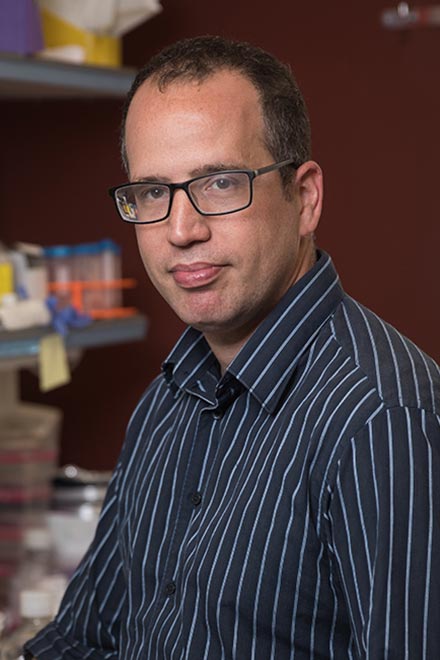Project title: Elucidate the developmental and regulatory heterogeneity of lung carcinoids
Yotam Drier, PhD Hebrew University of Jerusalem

- Status: Completed
- Year(s): 2019
- Grant Type: Investigator
- Research Type: Basic
- Primary Tumor Site: Lung
- Area of Inquiry: Mapping NET dependencies
Description
Drier proposes to uncover the gene regulatory processes that drive the aberrant expression of genes responsible for the development of typical and atypical lung carcinoids.
What question will the researchers try to answer?
What changes in gene regulation have the potential to promote typical and atypical lung carcinoids, and what are the differences between lung carcinoids driven by different gene dysregulation?
Why is this important?
It is difficult to predict the aggressiveness of lung NETs. Improved understanding of their regulatory networks may help identify prognostic and therapeutic biomarkers to improve the precision and effectiveness of treatment.
What will researchers do?
Using integrative genetic, epigenetic, and transcriptomic analysis, researchers will identify: the molecular underpinning of typical and atypical lung NETs, the regulatory and developmental differences between the two, and between lung NETs and other NETs, as well as derive a data-driven classification to identify new molecular lung NET subtypes.
How might this improve the treatment of NETs?
This new information may help develop new drugs to target the genes identified in this study or suggest the use of existing drugs that act on the genes identified, as well as help guide management of the disease according to new molecular subtypes.
What is the next step?
This study provides the research community with an improved understanding of lung NETs for future clinical studies of new, validated biomarkers (to support detection, prognosis, and disease management) and may suggest new therapeutic strategies.
Outcomes:
Cancer is caused by genetic mutations (changes to the DNA sequence) as well as by epigenetic alterations (changes in chemical marks on the DNA). The latter is involved in regulating the level of expression of genes, and therefore epigenetic alterations can induce genes that cause cancer and repress genes that protect against cancer. The regions that regulate the expression of genes are known as promoters, which are found immediately before the gene, and enhancers, which can be anywhere in the genome. Genetic mutations within genes are long known to play an important role in cancer and have been well studied, including in lung carcinoids. However, we know much less about genetic and epigenetic alterations in enhancers, and in particular these aspects have not yet been studied in lung carcinoids.
In this project we have characterized the set of active enhancers in a cohort of lung neuroendocrine tumors (NETs). We have identified two subtypes of lung NETs with different enhancer profiles. Comparing the two different enhancer profiles revealed the signaling pathways each subtype relies on and helped us identify a drug that specifically inhibits tumor growth of one of the subtypes. Preliminary experiments in mice validated the efficacy of this therapy, which we are beginning to test on a larger scale. This not only helps uncover the molecular underpinnings of lung NETs, but also opens the possibility to personalized medicine of lung NETs, where patients will be treated with new therapies according to their enhancer subtype of their tumor.
Additional Details
- City: Jerusalem
- Country: Israel
- Grant Duration: 2
DISCLAIMER
NETRF funds laboratory research to understand the development of neuroendocrine tumors and translational research to explore new concepts in treatment. Research grant descriptions and research updates from NETRF are not intended to serve as medical advice. It can take years for research discoveries to be fully validated and approved for patient care. Always consult your health care providers about your treatment options.
